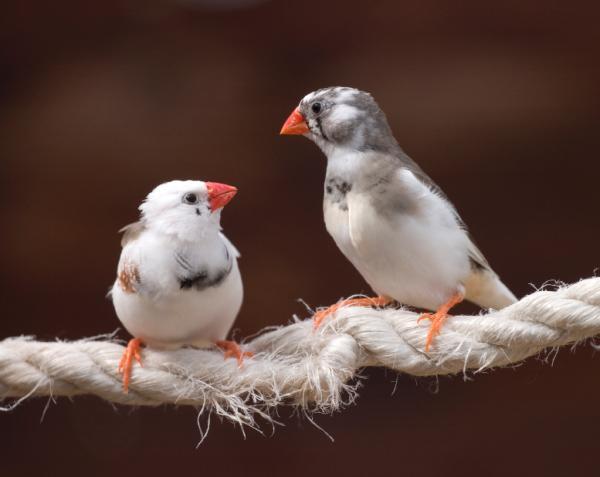Exercise and sleep help birds sing better
Exercise and sleep can help birds sing better. Reconstructing neural activity during sleep helps immature birds develop their own singing skills, researchers at the University of Chicago discovered.
Sleep is known for its vast role in the learning processes that have been studied in humans, including learning complex skills such as playing video games and learning new pronunciation. However, the neurological mechanism involved in strengthening the ability to learn during sleep has not been fully understood. To study this issue, researchers refer to a model in animals, the ability to develop bird singing skills that have long been said to be similar to pronunciation and language learning.
Sylvan Shank, a PhD in Psychology, and Daniel Margoliash, a professor of Biology and Anatomy and Psychology, published in the Nature that immature zebra finches listen to the song. Sing samples of adult birds and start practicing. The neuron's activity changes in the dark sleep afterwards. Sleep mental activity contains information about sample songs and bird's hearing responses when listening.These changes create progress in the ability to sing of immature birds that can be observed the next day.
Research is the first direct observation of night activities related to learning song skills.
Margoliash said: 'This research is a big step in understanding the impact of sleep on learning ability. We observe immature birds since they begin the learning process. We gained an understanding of the role of auditory information in sleep activity, and after that, we studied interaction with daytime activities that led to learning skills in singing. '
The change that occurs in the brain region causes daytime singing, but appears before changes in singing ability. Therefore, this finding provides a convincing hypothesis about how this learning process occurs. Immature birds exhibit a cycle of developing complex, sleep-dependent singing skills that have been observed in speech development processes.
 Zebra finches (belonging to learning). Exercise and sleep can help birds sing better. Reconstructing neural activity during sleep helps immature birds develop their own singing skills, researchers at the University of Chicago discovered. (Photo: iStockphoto / Andrew Corney)
Zebra finches (belonging to learning). Exercise and sleep can help birds sing better. Reconstructing neural activity during sleep helps immature birds develop their own singing skills, researchers at the University of Chicago discovered. (Photo: iStockphoto / Andrew Corney)
The complexity of their song decreases every morning, and returns to normal in the afternoon. This daily cycle of change plays an important role in learning singing skills - the largest birds in the early development process are the fastest learners.
Margoliash said: 'We have a new model on this issue. At night, hearing information that daytime bird contact is re-activated, changes the structure of the nervous system. These changes interact with changes when birds hear sample songs and practice '. The authors stated that night sensory re-activation may be the basic mechanism when learning a new skill '
In previous research, Margoliash and his team discovered areas in the brain where nighttime activity was reactivated.In adult birds, single cells spontaneously generate sleep-triggering cycles similar to those that explode when they sing during the day.
In this study, the team first observed the immature zebra finches. Using ultra-small electrodes, the team observed changes in neuronal activity during sleep in areas of immature zebra finches that involved singing - called acropalium (RA).
Shank and Margoliash first looked at the impact of bird contact on sample songs. They then extended their research to the role of auditory feedback in stimulating learning. They want to see if changes in the brain during sleep after exposure to a song can be strengthened by practicing and listening during the day. They hypothesize that the interaction of listening, exercise and sleep can explain the bird's learning process.
To test the role of auditory feedback on bird learning, the team used 100 decibels of clean sound to prevent birds from hearing their voices. In subsequent tests for brain activity, the team did not detect any changes in brain activity after exposure to clean sounds, even when the birds listened to the sample song. This finding demonstrates the importance of hearing feedback; After the clean sound is removed, the birds start learning normally.
Margoliash said: 'There is a famous theory called' model theory 'about bird learning. This theory asserts that a sensory pattern is formed when listening to the song of an adult bird, and this pattern is used to evaluate sensory feedback. We do not know the status or form of this model's activity. We now understand one thing: that pattern can affect the ability to learn through sleep, and this information is quickly distributed throughout the brain. '
Neural neurons in RA do not show auditory activity during the day, but the nighttime operation shows auditory signals. Margoliash predicts that 'dreams can be attractive because there are more areas used to reproduce sensory feedback'.
- Ask easy, difficult to answer: Why do birds sing?
- How do birds learn to sing?
- Birds sing more flexibly when the weather fluctuates
- The best exercise times
- Noise pollution, birds must sing at night
- Listen to mice 'sing' like birds
- Pollution makes birds sing better
- Being hungry will not sing
- When we sleep, we are like birds
- The sooner the eggs are laid, the better the birds sing
- How to sleep well when the heat is nearly 40 degrees C
- Want a good sleep, which food should you eat?
 Animal 'suffering' after hibernation
Animal 'suffering' after hibernation Why do goats climb well?
Why do goats climb well? Scientists were surprised to see chimpanzees eating turtles
Scientists were surprised to see chimpanzees eating turtles Giant catfish died deadly due to drought in Thailand
Giant catfish died deadly due to drought in Thailand